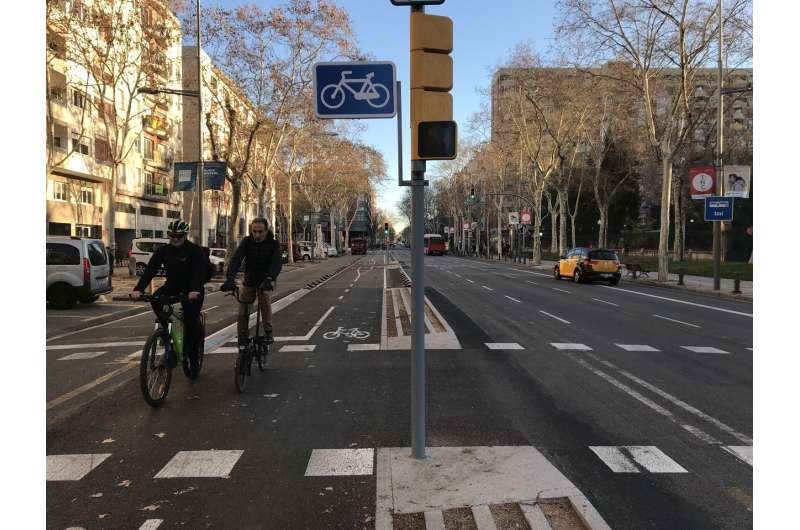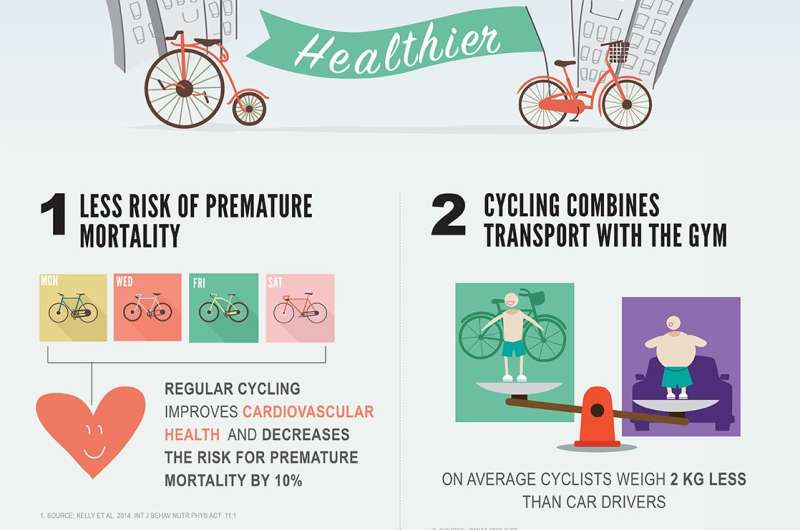Cycling networks could prevent up to 10,000 premature deaths in European cities

A study led by researchers from the Barcelona Institute for Global Health has found that expanding designated cycling networks in cities could provide considerable health and economic benefits.
Analysis of data from 167 European cities suggests that the length of cycling infrastructures is associated with a cycling mode share of up to 24.7 percent, in which one in every four citizens is likely to choose cycling for their daily commute. The study, published in Preventive Medicine, estimates that if all the cities under study achieved a 24.7 percent bicycle mode share, over 10,000 premature deaths could be avoided annually.
"This is the first study evaluating the potential associations between cycling network length, mode share and associated health impacts across European cities," says Natalie Mueller, ISGlobal researcher and first author of the paper. The health impact assessment showed that a routine shift in the transport mode to cycling is positive for health due to the associated increase in physical activity. "These benefits outweigh detrimental effects of air pollution and traffic incidents," adds Mueller.
The greatest health benefits among the different estimations made by the researchers were found in a scenario where the assessed cities had bike lanes in all their streets. In that case, London could avoid up to 1,210 premature deaths yearly, followed by Rome with 433 premature deaths yearly, and Barcelona with 248 premature deaths yearly. However, a 10 percent increase in designated cycling infrastructure was estimated to lead to significant increases in cycling and resulted in 21 premature deaths preventable in Rome, 18 in London and 16 in Barcelona.

The researchers also performed an economic analysis to compare the costs of increasing cycling networks with the estimated economic benefits of prevented premature mortality. Results show that the best cost-benefit ratios would be met in a scenario of a 10 percent increase in the cycling network, in which the ratio of benefits per euro spent would be up to 70 to 1 in the case of Rome, 62 to 1 in the case of Zurich, and 35 to 1 in the case of Barcelona.
"Even though we did not consider other determinants of cycling and cannot infer causality here, we simply like to express that cycling networks should be high up on the agendas of city governments, which have direct local accountability for providing healthy choices to their citizens," says Mark Nieuwenhuijsen, coordinator of the Urban Planning, Environment and Health Initiative of ISGlobal and last author of the study. According to the study, cities with low cycling mode share (such as Rome, Barcelona and London), have great potential to increase cycling just by expanding their cycling networks. "A 10 percent increase in cycling infrastructure, which we perceive as an achievable policy for city governments, most likely provides considerable health and economic benefits," adds Nieuwenhuijsen.
"Once again we can see that getting people out of their own cars produces great health benefits. A combination of 'push' measures that make cars unattractive and 'pull' policies aimed at making public transport and cycling more appealing would be best to improve health and well-being in European cities," concludes researcher Natalie Mueller.
More information: Natalie Mueller et al, Health impact assessment of cycling network expansions in European cities, Preventive Medicine (2018). DOI: 10.1016/j.ypmed.2017.12.011


















